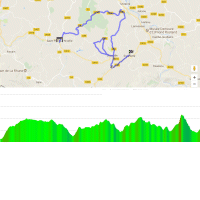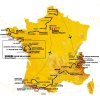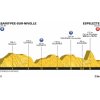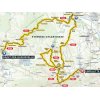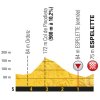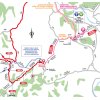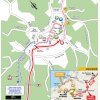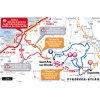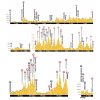As was the case in 2017, the penultimate day of the Tour brings the decision on the overall win with an individual time trial. But the course is much tougher than the 2017 stage in Marseille. It is not only longer, with four intermediate climbs but it is also a lot hillier.
The riders roll down the ramp and climb the first 4.2 kilometres at 3.2% with its steepest section of (800 metres at) 6.1% shortly after the start. Following a rolling section and a drop the road goes up again. A punchy stretch of 400 metres at 4% appears at kilometre 12 before the route continues as a undulating uphill until kilometre 16.2.
A gentle plunge of 2 kilometres runs to an irregular 2.7 kilometres climb with some flat sections and its steepest ramps at 8%. Following another rolling descent (5 kilometres) the riders tackle the toughest climb at kilometre 26.5. The first metres of the Côte de Pinodieta go up at a mild 4% before the true action begins. In the next 800 metres the climb is averaging 10.5% with its steepest ramp at 21%. The top is 3 kilometres from the finish in Espelette, which is almost all on descent, although the last 500 metres of the race rise at 3%.
The 31 kilometres length of the test means that the Tour de France features even less individual time trialling than last year, again beating the record for the lowest number of individual time trial kilometres in the race’s history.
Read also: results 20th stage 2018 Tour de France.
Tour de France 2018 stage 20: Route maps, height profiles, and more
Click on the images to zoom
